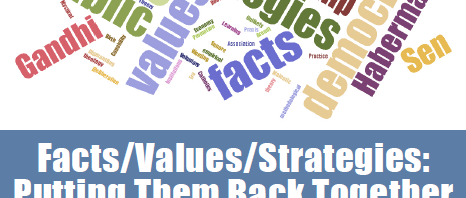- Facebook144
- Total 144

Current global crises of democracy raise fundamental questions about how citizens can be responsible and effective actors, whether they are combating racism in the United States, protecting human rights in the Middle East, or addressing climate change. If “citizens” are people who strive to leave their communities greater and more beautiful (as in the Athenian citizen’s oath), then their thinking must combine facts, values, and strategies, because all three must influence any wise decision. Mainstream scholarship distinguishes facts, values, and strategies, assigning them to different branches of the academy. Many critics have noted the philosophical shortcomings of the fact/value distinction, but citizens need accounts of how facts, values, and strategies can be recombined, both in theory and in practice. John Dewey, Hannah Arendt, Mahatma Gandhi, Jürgen Habermas, Amartya Sen—and many other theorists of citizenship—have offered such accounts.
Actual civic movements also combine facts, values, and strategies in distinctive ways. For instance, the American Civil Rights Movement used the language of prophesy, and Second Wave Feminism strategically advocated new ways of knowing.
These papers propose theoretical, methodological, historical, and empirical responses and case-studies related to the question: how should citizens put facts, values, and strategies together?
Papers
- “Public Entrepreneurship, Civic Competence, and Voluntary Association: Self-Governance Through the Ostroms’ Political Economy Lenses” — Paul Dragos Aligica, George Mason University
- “Giving Birth in the Public Square: Dialogue as a Maieutic Practice” — Lauren Swayne Barthold, University of Connecticut
- “William James’s Psychology of Philosophizing: Selective Attention, Intellectual Diversity, and the Sentiments in Our Rationalities” — Paul Croce, Stetson University
- “The Praxis of Amartya Sen and the Promotion of Democratic Capability” — Anthony DeCesare, St. Louis University
- “Social Media, Dismantling Racism and Mystical Knowing: What White Catholics are Learning from #BlackLivesMatter” — Mary E. Hess, University of Toronto
- “Institutions, Capabilities, Citizens” — James Johnson, University of Rochester, and Susan Orr, SUNY College at Brockport
- “Forgiveness After Charleston: The Ethics of an Unlikely Act” — Larry M. Jorgensen, Skidmore College
- “Facts, Values, and Democracy Worth Wanting: Public Deliberation in the Era of Trump” — David Eric Meens, University of Colorado Boulder
- “When Democracy Had Roots and Airwaves: Putting Facts, Values, and Strategies Together in Rural America” — Timothy J. Shaffer, Kansas State University
- “A Civic Account of Justice” — Karol Edward So?tan, University of Maryland
Paper titles are preliminary
Conference chair: Peter Levine, Tisch College, Tufts University.
Good Society editor: Trygve Throntveit, University of Minnesota
